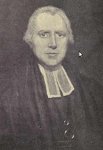

 Recollections of Dr
Roderick MacLeod (extracts)
Recollections of Dr
Roderick MacLeod (extracts)
| My Dear Sir, You are a naughty man. I fully expected to have heard from you by Mr. Langton, but received only three lines from George, with this conclusion, 'No news whatever'. Now I expect much news of what has been done in the parish since I left it. In this expectation I meet with no sympathy from my young folks here. They ask 'Why do you think so much of dirty Dean Street?' They do all they can to make me forget it, and pull me about often against my will, and say, as usual, it is all for my good. I have much cause to be thankful for their affectionate care of me, and am better in health than I have any right to expect. I sleep well at night, and they do all they can to amuse me through the day but I still wish to get back to the old Church, and to relieve you of some part of your duty which must, I fear, press hard upon you, in my absence. Pray tell Sawyer tho' he has done so much for me, I shall go back as poor as any Church rat, and I hope he will endeavour to get the remainder of my Midsr. rents paid up before I return . . . Who is to assist you at the Sacrt. the first Sunday in Septr. I am forbidden by the Dr. to write, and you may see I am unfit for it, but it will drive no blood into your head to write me a long letter, and 1 shall be most thankful for it. Pray accept our united best regards, and believe me to be, my dear Sir, Yours very faithfully, RODK. MACLEOD |
Back to Clergy 1729-1860